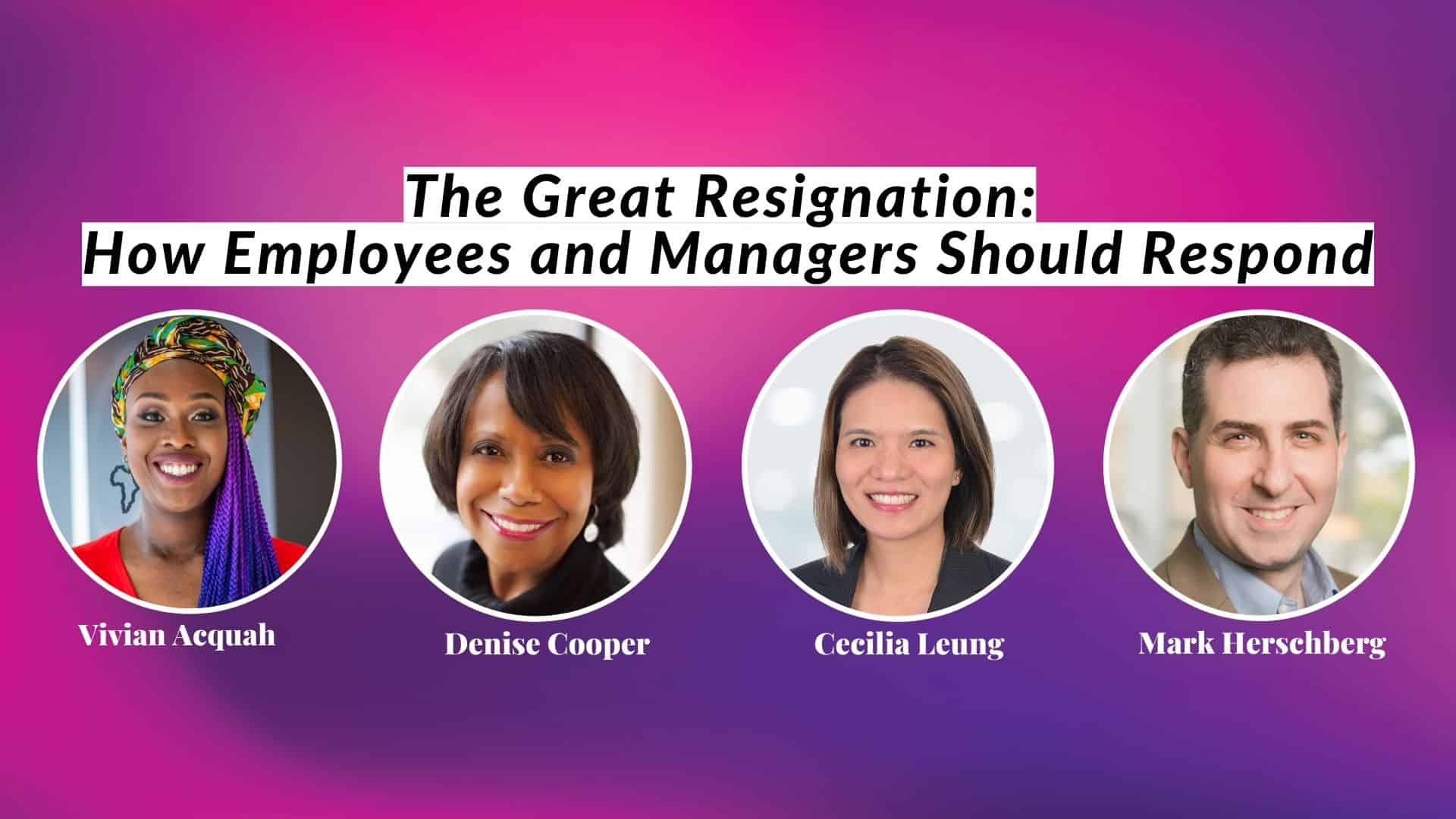The Great Resignation. It sounds serious, doesn’t it? This term has been thrown around in every media story or report about employment trends during the pandemic.
The Great Resignation refers to the massive number of people who left, or are planning to leave, their jobs. There are many reasons for this, including industry shifts, labor shortages, changing priorities, new working arrangements, and general dislike and discontent for work. Many people are also looking for workplaces that prioritize diversity, equity, and inclusion.
Studies indicate that 41% of team members are thinking of leaving their jobs in the next six months. That is a significant number and if it occurs, it can dramatically shape workplaces. You may be one of the 41%, or maybe you are a leader or manager worried about this massive turnover. Either way, open conversations about what’s happening and how to address it are necessary to have!
On an episode of Let’s Humanize the Workplace, we talked about just this.
Sitting down with host Vivian Acquah were guests
- Denise Cooper, founder and CEO of Remarkable Leadership Lessons;
- Cecilia “Cece” Leung, founder and managing partner of The Entrepreneur CFO;
- Mark Herschberg, author of The Career Toolkit and an MIT Instructor.
Humanizing the Workplace: The Problem with HR
Our interest on this show, Let’s Humanize the Workplace, is—you guessed it!—humans. People matter. We want workplaces that are inclusive and allow each person to show up as their individual selves to do their best work.
And it’s precisely because we have not humanized the workplace that so many people are leaving. So, is HR to blame for the Great Resignation? In part, yes. As Denise Cooper pointed out, HR hasn’t really changed for about 100 years. The department exists to protect the company from bad managers. It’s process-driven, only focused on hiring people and retaining them.
Mark Herschberg tends to agree, saying that we are only good at measuring obvious outputs like revenue or other benchmarks. Human capital is much harder to capture and understand. Sometimes, diversity, equity, and inclusion (DEI) get left to the side because they are not as straightforward as sales reports numbers.
Valuable Lessons from The Great Resignation
The Great Resignation has shone a light on a few issues in our workplaces. If 41% of the working population is considering leaving their position in the next six months, it’s important to analyze and understand why.
Here are two of the lessons from the Great Resignation that our panelists discussed:
- Flexibility is key. The companies that were able to survive and thrive during the pandemic are the ones that could pivot and make changes. They were able to support their employees to be flexible during challenging circumstances and retain staff instead of losing them to high turnover.
- Capacity for change and growth matters. The resiliency of a workforce is measured by their ability to change and adapt. And if that’s not happening, leaders need to ask why. It could be that employees are burnt out and simply don’t have that resilience.
The Great Resignation should be used as an “Aha!” moment by companies—a chance to evaluate how they’re doing and where they want to get to. Looking at how they managed the challenges of the pandemic is a great starting point.
“How can we ensure that as the world shift, and as change continues… How are you ensuring your organization is growing your capacity to adapt, change, and react?” -Denise Cooper
What’s an Employee To Do?
Since so many employees are considering leaving their job, a lot of them are asking: now what? What is the next step for their career? March Herschberg encourages employees to be thinking about what they want in life. Not just in a job, but in life. What work-life balance do they want? And then, how does a career fit into that.
In the last few decades, the question has always been: what do you want to be when you grow up? Graduating students are expected to choose a singular career and then move that direction.
Instead, we need to think about the life we want and find a career that fits with it. People can start by asking themselves a few questions:
- What work-life balance do you want?
- Do you want to work from home or in an office?
- What are your values outside of work hours?
- Does company culture matter to you?
- What did you like and dislike in previous jobs?
- Why do you want to leave this position? (Get specific!)
These questions can be a starting point for employees looking at what’s next for them. But sometimes the answer to them is to stay put. You might not like certain things about your job, but sometimes a single conversation or adaptation can make it better.
“People are just focusing on leaving where they are today. They are moving from, not moving to. But you always want to be going to a destination, not from a destination in life … Think about where you want to be in 5-10 years, and how this next job is going to take you towards that ultimate goal.” -Mark Herschberg
Once you know what you want and do some introspection, you can determine the next move. It might be to:
- Stay in your current job and speak up to make things better.
- Change jobs and pursue a different path.
- Build up a side hustle before making the switch.
- Pursue higher education or upskill yourself.
The other important thing for employees to remember is that there is no roadmap anymore. That idea that there is only one path for your career? Not true! You might end up working in an industry that didn’t even exist until a few years ago.
It’s precisely because there are so many opportunities out there that each person should invest in upskilling and identifying their transferable skills. This will open opportunities to pursue different things. Growing your network is equally important, as it can open doors for you as you look for your next move.
Leaders are also human. They cannot read your brain; they cannot read your mind. So, if you’re seeing something that you don’t like, ask them: Is there a budget to upskill? Is there a budget to train? Or what do I need to do to become X, Y, Z? Ask them and then see what happens.” -Vivian Acquah
Tips for Leaders to Avoid The Great Resignation
“People don’t quit a company, they quit the manager.” This old saying gets tossed around quite a bit, and there is truth to it! Leaders and managers have a massive impact on their employees and have a lot of power to either positively or negatively influence an experience.
Managers might be nervous about The Great Resignation and the fact that employees are seeking out better opportunities. But this is also an opportunity for them to learn, grow, and become a better leader.
Tips for managers to become a better leader
Here are a few tips for managers during this time:
- Focus on trust. Without trust, there can be no open communication. And without communication, problems and issues don’t get resolved and employees will quit.
- Help employees achieve their goals. Focus on helping every person have autonomy and ownership over their work. Empower people to do their best so that they feel like they belong and can contribute.
- Consider why people are working for you. Is it about a paycheck? If it is, there’s always another job with more money. While the salary is important, you want employees who have more than one reason to stay at the job.
- Offer upskilling opportunities: Growth is a powerful motivator, so encourage employees to upskill and improve their knowledge and abilities. It will benefit you and the company, but it also creates a more highly engaged employee.
The Great Resignation is a learning opportunity for leaders and managers to step up. That statistic of 41% people wanting to leave their job does not have to become a reality in your workplace. If leaders take the time to evaluate, get curious, have open conversations, and make necessary changes—they can build a strong and happy workforce.
We hear about it all the time nowadays: communication is super important. We all know that! But the reason why people don’t communicate, cannot share, or be open about what’s really in their mind is because there’s no trust. -Cece Leung
Conclusion
The Great Resignation not only sounds serious—it is serious. It has exposed a lot of flaws and challenges in the current system. It’s revealed discontentment, frustration, and negative workplace experiences. Employees are leaving because they are not fulfilled or diversity and inclusion are not prioritized.
But this movement is also a Great Opportunity! It’s an opportunity for employees to evaluate what they really want in life, and how a career can help with that. But it’s also an opportunity for employers and leaders to learn and grow, making changes to improve the workplace and employee experience.
We talk about all-things related to work, the workplace, and diversity, equity, and inclusion (DEI) on Let’s Humanize the Workplace. Make sure to check out the YouTube channel for more inspiring and important conversations. Also take a look at Vivian Acquah’s conference, Amplify DEI, to continue to expand your knowledge and amplify DEI in your workplace!
Watch this snippet by Trevor Noah







